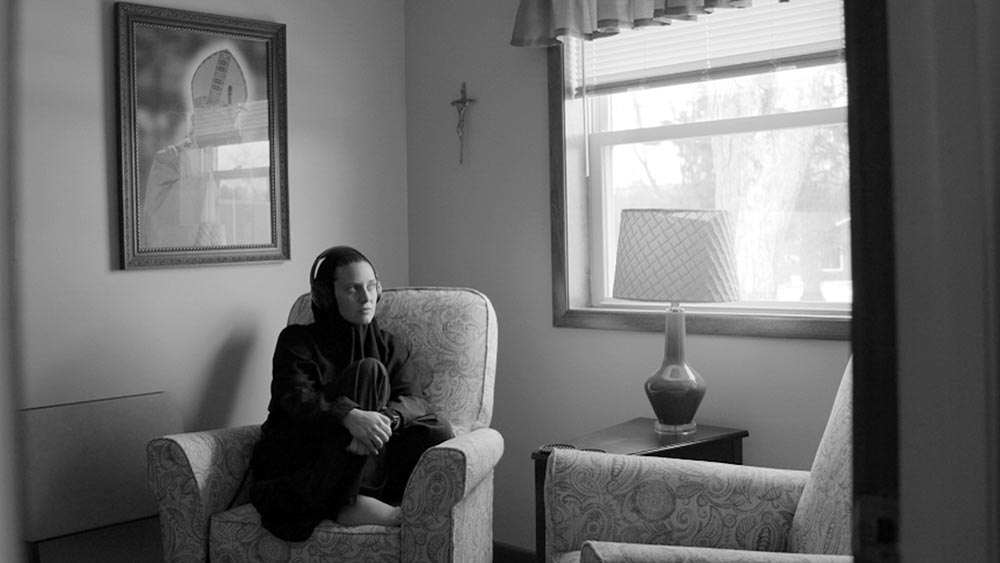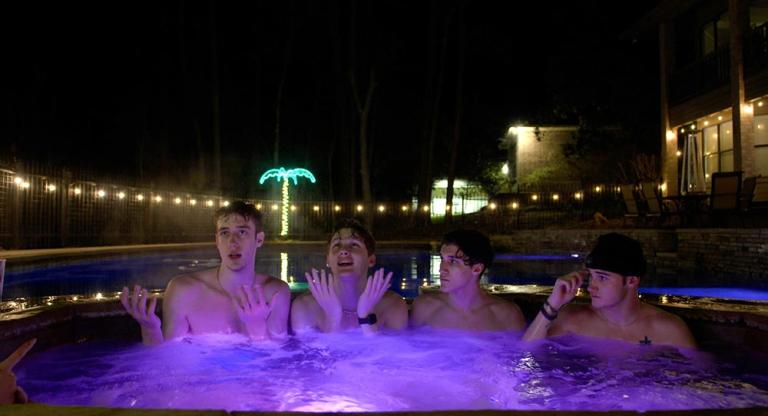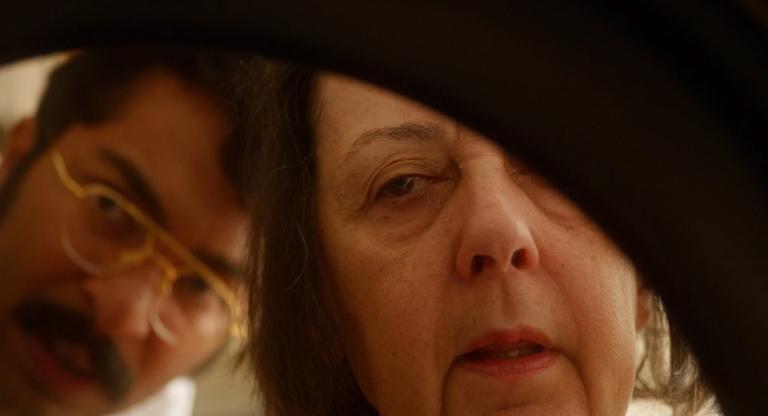One of my highlights at True/False this past spring was Natalia, Elizabeth Mirzaei’s absorbing documentary about a 29-year-old engineer who’s on the verge of becoming a Catholic nun at a church somewhere in America. Here’s what I said in my festival report and, by gum, I stand by it: “Filmed in black-and-white, with square framing, Natalia has donned a habit to prepare alongside sisters for the novitiate, but she openly and anxiously expresses her uncertainty about leaving her former life behind: dating men, the prospect of children, the regular society of family and friends. Mirzaei (who co-directed the Oscar-nominated short Three Songs for Benazir, 2021) bucks the conventions of many cinematic studies of faith, with their static monumentality and forbidding Old World backdrop. Instead she keeps pace (emotionally and physically) with her dynamic subject and searches for scenes, moments and images that might express or reflect a glimmer of Natalia’s interiority and spirituality. A certain wistfulness can flutter into view because this is, in a sense, a farewell tour for Natalia—but stronger still is Mirzaei and Natalia’s sense of humor. That sometimes comes through in the natural juxtapositions between Natalia’s Byzantine-era calling and the trappings of modern life and suburbia—ordering fast food, going on her advising priest’s podcast, watching Star Trek on a laptop—but the contrasts are thought-provoking, not cheap . . . More vividly than any documentary on faith I can remember, Natalia (and Natalia) shows how doubt can make one better understand belief.”
While in Columbia, Missouri, for True/False, I caught Mirzaei just before she left town, with the film’s co-producer, Omar Mullick (These Birds Walk) sitting in. Over the din of a lunch crowd and a line of people waiting to get into the Ragtag, I asked her about making a film about religion, personal choice, and what might outwardly sound like intensely unfashionable subject matter. Natalia has its New York premiere on August 10 as part of Rooftop Films.
What was Natalia’s reason for participating in the documentary?
She was really in love with the person of Christ, even though she couldn't see him or touch him or anything. And she felt like she was being called to get married to him. We don't identify the monastery in the film, but it's based around the Song of Songs, which is so evocative.
It’s also erotic.
It's really erotic, very seductive. They sing it every day at the monastery. And after she made her life profession, the first thing she did was she went on what they call a honeymoon: she goes into the chapel by herself for three days—the nuns bring her food and she sleeps in there. None of that is part of the film because it's far too intimate. I think for her, it was something really mystical that is really hard to articulate.
Throughout the movie, I was trying to remember this Orson Welles quote that there are two things—
...that you can’t film—sex and prayer?
Yes!
I said that yesterday! I was in a one-on-one with this other filmmaker who did this film called Man on Earth about the last seven days [in the life of a man who chose euthanasia]. I said to him that the one Welles didn't include is death, and that both of us crossed a line. Not the sex line but prayer and death.
How do you approach depicting prayer and spirituality in a documentary?
It presented so many unique challenges, because how do you show that? Working with Natalia, we collaborated on the idea of showing the practice of letting go of all her photos from the past and everything. But it's like you can't access that space [of spirituality]. I think that's also why I wanted to end the film on an open-ended ascension into the unknown. Omar, did you want to add something?
Omar Mullick: The film is daisy-chained back with other people who contended with [spirituality] in Nordic, stoic ways. What I was so excited about—and knew was important to Elizabeth—was to take that language and drag it into this vibrant, feisty, boy-crazy Midwestern girl and then add to that Elizabeth’s own unique language—the elemental, the quiet. It's taking cinema up to its limit. It doesn’t literalize Christ in an actor or somewhere else. It goes up to where this nun is praying and in her contemplative inner world, and allows you to sit at the limit of that, and also open a door for you to bring your own experience and imagination into that. You can wander in, as someone did yesterday and then afterward in tears told me he had a sublime experience.
I thought about the film’s reception in that regard. How did you think about how different audiences—church-going and secular—will view the movie? I rode a festival shuttle with someone who had seen it and seemed to have some issue with the monastic idea of letting your previous self die off in some way.
That's really interesting, because I want the film to meet people where they are, and I think it might show some things to people that are really repugnant to what their own sensibilities are. It challenges you to sit in this space with this person who you might disagree with. We both have had experiences after a screening when people have come up crying, and even in pain, because the film brought something up for them about their own journey with faith or lack of faith. I knew it was going to walk that line.
Speaking of representing spirituality: I can't believe Natalia has an actual serpent—a pet snake.
[laughs] Georgia is the name.
You also show Natalia watching Star Trek, which is a funny detail, but it’s also meaningful: the religious context underlines how the show is posing philosophical and moral questions. I’m not sure if it was the TV show or one of the movies.
One of [the clips] was The Wrath of Khan [Star Trek II].
Right—I saw Kirstie Alley in it.
Was that Kirstie Alley? I didn't realize that. I think you’re right.
She was a Vulcan in what I believe was her film debut. Where am I going with this? I liked how her watching TV is also a mundane activity that represents the world she’s leaving behind. But you show this dissonance between the banal and the profound in a way that doesn’t turn it into a cute joke.
That's good. Yeah, I think it's this idea of living in the world and out of the world at the same time. I saw the ways that the world itself presented these questions to her, Star Trek in particular, themes like when Captain Kirk says that how we deal with death is at least as important as how we deal with life. Or in the other episode they’re talking about an idyllic version of Earth. All of this. I just saw the way that she's in one reality, and that reality is sometimes punctured by the other world coming into hers. So I was trying to find ways to show how that boundary dissolves at times. But it was very intuitive.
Did you always think she was going to go through with becoming a nun, or did you ever think she might not?
I didn't fully know. I saw a lot of dedication and devotion in her, but her life profession had also been canceled multiple times for different reasons. She would make a joke that people said, “Oh, that's just the Devil intervening.” And she said, “At what point do we stop thinking it’s the Devil and start thinking it's Jesus telling me not to do this?” So I didn't know, and I think that's the real beauty of documentary: you just don't know, and you just follow. And she was so open about all of that and letting me into this area of her life that's really vulnerable at this time of transition. None of this would have been possible without her collaboration.
How hard was it to arrange access?
It took a little bit to negotiate access to the monastery. I had to go through the Mother Superior. We had conversations, and then she was like, yes, come. They were pretty open with everything I could film. I couldn't film her “honeymoon” in the church, but that was kind of it. I am a big believer in how you don't make a documentary in a vacuum, you're making it about someone, and we talked a lot about the issue of subject and director and the power dynamics at play. The only areas where she wanted to make sure she was going to be okay with was anything related to modesty. For example, if her scarf came off a bit and there was hair showing, or at the waterside scene.
You also show how people around Natalia react to her decision. Her parents are supportive, but then there’s that awkward voice mail she gets from someone that she should reconsider what she’s doing.
Yeah, there were a lot of people that felt like they wanted to save her from this choice she was going to make. She often gets comments like, “Why would you do this” or “What a waste.” Because she’s not getting married or having kids. And she will retort back, “Well, I have a lot of friends that are studying and they're pursuing careers, and they're not having kids, and if I was doing the same, would you say that to me then? Or is it because I've pursued a religious life that you feel like it's a waste?” So that pushback is always there.
I think Father Michael articulated that the monastery in some sense protects them from that reality. And we wanted to bring that in, wherever it could come from, because it is part of the truth of what's happened and what makes her decision so countercultural in this day and age. It wasn't maybe countercultural before. But now, to autonomously choose this life that's so outside of the realms of understanding in the secular world...
Also, in the past, it might have been more of a family decision rather than a personal choice—putting your daughter in a convent.
Exactly. Or it's like you had no other options, or you're running away from something. And that's what Father Michael really pushed her about, too: are you running away from world? He's quite frank with her.
Do you see any parallels with your short, Three Songs for Benazir?
They're similar in some sense because Shaista and Benazir in Three Songs for Benazir are this young couple in Afghanistan living on the margins of society in this camp. They're completely ostracized by the community in Kabul. He’s not accepted in his own family. And that idea of people that are living on the periphery and misunderstood or misaligned, I felt that with Natalia too. Also, the idea of young women pursuing a particular kind of religious vocation and devotion, because the orders that seem to be really growing are the ones that are much more traditional, in the habit. So there's something there that I felt hasn't been explored, because a lot of the time, films about religion are about someone leaving whatever that religion is. Very rarely it's about that decision to stay. Obviously, the films are very different, but there’s also [the issue of] representation too. We always see Afghanistan framed in the context of war and violence and the news, but Shaista and Benazir’s story in Three Songs for Benazir is positioned as a love story. And Natalia is also a love story, but the object of her affection is God. It’s also my first film in the United States, but it is like another world. A monastery is its own world just like that camp was its own world.




